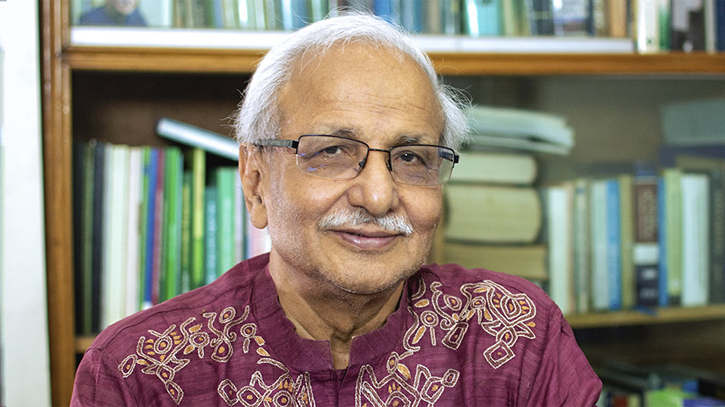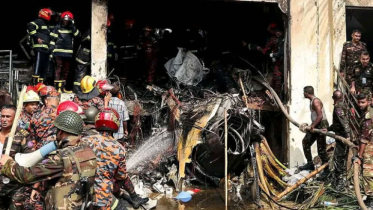
Distinguished political analyst and economist Dr. Badiul Alam Majumdar. Photo: Collected
A distinguished political analyst, economist, and expert in local government, Dr. Badiul Alam Majumdar currently holds the position of Country Director and Global Vice President of The Hunger Project. Additionally, he serves as the founding secretary of the civic organisation SHUJAN (Shushashoner Janyo Nagorik). In an exclusive interview with The Daily Messenger, Dr. Majumdar delved into discussions about the current political climate, the economic crisis being faced by the nation, and insights into the contexts surrounding the upcoming 12th parliamentary polls. The interview was conducted by Staff Reporter Prakash Kayef.
Messenger: How do you assess the current political situation in Bangladesh?
Badiul Alam Majumdar: The political landscape in the country is deeply concerning. There's a palpable sense that the citizens may once again find themselves marginalised. We witnessed a denial of voting rights in 2014 and 2018, and there's a looming fear of history repeating itself in the upcoming 12th National Assembly elections. This disenfranchisement extends to city corporations and numerous local government elections, creating a prevailing doubt about the possibility of a fair vote in the current political climate.
Voting is a fundamental right for every citizen, an unyielding aspect of democratic societies. The inability to exercise this right not only undermines the democratic process but also poses a significant challenge to the legitimacy of the ruling party. The present political situation raises concerns about the potential fallout. The volatility of a dysfunctional democratic system can lead a nation into perilous territory, and as a society, we risk descending into chaos. Moreover, there's an imminent threat of an economic downturn for Bangladesh, adding another layer of complexity to the current predicament.
Messenger: A significant number of political parties are abstaining from participating in the polls. What implications might this have?
Badiul Alam Majumdar: The number of registered parties or those forming alliances to participate in the elections holds limited significance. Elections fundamentally revolve around the choices made by the electorate, aiming to select the most suitable candidate. In the electoral landscape of Bangladesh, the two predominant parties are the Awami League and BNP. If either of these key players opts out of the electoral process, the legitimacy and acceptance of that election are compromised, both domestically and internationally. The absence of one of these major parties diminishes the election's credibility and its adherence to accepted criteria. Therefore, the sheer quantity of registered parties becomes inconsequential in the absence of meaningful participation from the primary contenders.
Messenger: Do you anticipate either of the two major parties conceding defeat?
Badiul Alam Mazumdar: The paramount consideration should be the public interest, transcending the interests of any political party, when it comes to acknowledging defeat. Historical patterns indicate that elections conducted under party-led governments often face challenges in gaining widespread acceptance. On the contrary, elections held under neutral administrations tend to enjoy greater legitimacy among the public.
The upcoming election, being conducted under the auspices of the ruling government, raises concerns about its fairness and inclusivity. The main opposition party, BNP, has encountered various obstacles that have effectively sidelined them from the political arena. Persistent actions by the ruling party and law enforcement agencies continue to suppress BNP leaders and activists, restricting their access to party offices and even disrupting their ability to lead normal lives at home.
Messenger: In the face of increasing international pressure for a free and fair election, what actions can the Prime Minister take?
Badiul Alam Majumdar: It is imperative for the Prime Minister to orchestrate an inclusive and impartial election, involving all political parties. Successfully achieving this would be a positive development for the nation, fostering a climate of fairness and acceptance. The extent to which the Prime Minister can navigate and address international pressures remains uncertain. Only time will reveal the course of action taken in response to these external influences.
Messenger: Considering the United States as the largest market for Bangladeshi clothing, how challenging would it be for Bangladesh if sanctions were imposed?
Badiul Alam Majumder: The United States holds a pivotal position in the Bangladeshi garment industry, serving as our largest market. Indications suggest that if, for any reason, the United States imposes sanctions on our garment sector, the ensuing shock would pose significant challenges for our economy. The repercussions would be akin to a tsunami, affecting not only the apparel industry but sending ripples throughout our entire economic landscape. It is crucial to anticipate and address this potential threat by taking proactive measures. A key step in this process involves organising an impartial and widely accepted election where all political parties can actively participate. By doing so, we not only safeguard our economic interests but also emphasise the importance of ensuring workers' rights from this point onward.
Messenger: A significant number of BNP leaders are currently incarcerated, while a few have switched allegiance and are participating in the elections. Simultaneously, there's an ongoing movement within the BNP. In this complex scenario, what direction might the situation take?
Badiul Alam Mazumder: The present political landscape, characterised by the lockdown of one party's offices and the festive atmosphere of election campaigns in another, is far from ideal. The government's approach of using law enforcement agencies to suppress opposition figures, particularly within BNP, raises serious questions not just within the country but globally. The extensive arrests of around 21,000 BNP activists and the reported instances of individuals seeking refuge in forests out of fear of law enforcement, as depicted in the media, portray a concerning image. This situation has effectively marginalised many, hindering their active participation in the political arena. The orchestrated context appears to be a deliberate strategy to sideline BNP from the electoral process. This is an undesirable state of affairs that warrants prompt resolution.
Messenger: How do you perceive the recent transfer of UNO and OCs in anticipation of the elections?
Badiul Alam Majumdar: The current scenario, where the Deputy Commissioners (DCs) and the Superintendent of Police (SP), gives them control over Returning Officers (ROs) and Officers-in-Charge (OCs). Thus, the replacement of UNOs and OCs seems more like a symbolic gesture than a substantive change. It appears to be more of a show than a meaningful reform.
Messenger: What if voters find themselves unable to select their preferred candidates in a competitive election, similar to past instances?
Badiul Alam Majumdar: The reality is that past elections were conducted in a manner where voters faced challenges in freely choosing their preferred candidates. In fact, the election was held.
Messenger/Sun Yath








